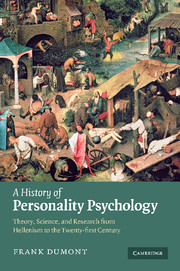 A History of Personality Psychology
A History of Personality Psychology Book contents
- Frontmatter
- Contents
- List of tables and figures
- Preface
- 1 Historical precursors of personality theory
- 2 From illness to wellness models of human nature
- 3 Developmental perspectives on personality: from youth-based to life-span models
- 4 The biology of personality
- 5 Trait theories and the psychology of individual differences
- 6 The puzzle of the self
- 7 Culture and personality
- 8 Gendered personality
- 9 Emotions and reasoning: a definition of the Human
- 10 Taking the measure of the Human: benefits and inherent limitations of personality measures
- 11 Can personality change? The possibilities of psychotherapeutics
- 12 The disordered personality: evolution of nosological systems
- 13 Eight appendices: at the margins of personality psychology
- References
- Author index
- Subject index
9 - Emotions and reasoning: a definition of the Human
Published online by Cambridge University Press: 03 May 2010
- Frontmatter
- Contents
- List of tables and figures
- Preface
- 1 Historical precursors of personality theory
- 2 From illness to wellness models of human nature
- 3 Developmental perspectives on personality: from youth-based to life-span models
- 4 The biology of personality
- 5 Trait theories and the psychology of individual differences
- 6 The puzzle of the self
- 7 Culture and personality
- 8 Gendered personality
- 9 Emotions and reasoning: a definition of the Human
- 10 Taking the measure of the Human: benefits and inherent limitations of personality measures
- 11 Can personality change? The possibilities of psychotherapeutics
- 12 The disordered personality: evolution of nosological systems
- 13 Eight appendices: at the margins of personality psychology
- References
- Author index
- Subject index
Summary
Consciousness is the key to a life examined, for better and for worse, our beginner's permit into knowing all about the hunger, the thirst, the sex, the tears, the laughter … the flow of images we call thought, the feelings, the words, the stories, the beliefs, the music and the poetry, the happiness and the ecstasy. At its simplest and most basic level, consciousness lets us recognize an irresistible urge to stay alive and develop a concern for the self. [And] at its most complex and elaborate, consciousness helps us develop a concern for other selves and improve the art of life.
Antonio Damasio (1999, p. 5)Setting the tone: some prolegomena
Emotions have traditionally been thought of as distinct from reason, just as thinking was considered to be distinct from feeling (LeDoux, 1996, pp. 15, 24). This hallowed philosophical view goes back to the Hellenism of more than two millennia past. Plato, in Phaedo, affirmed that emotions made clear thinking difficult. On the other hand, he gave short shrift to the view that emotions were useful to improve thinking, especially the thinking that leads to practical judgments. Today most psychologists are convinced that our thinking about serious social problems will be significantly distorted if we try to exclude consideration of the emotions associated with those problems. Impairment or neglect of either one diminishes them both as, indeed, they seem to constitute a single faculty. This chapter is dedicated to exploring these propositions.
- Type
- Chapter
- Information
- A History of Personality PsychologyTheory, Science, and Research from Hellenism to the Twenty-First Century, pp. 294 - 328Publisher: Cambridge University PressPrint publication year: 2010


